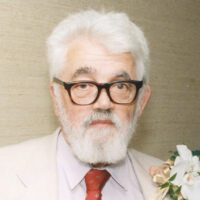
1988 Kyoto Prize Laureates
Information Science
/ Computer Scientist
1927 -2011
Professor, Stanford University
The Logic and Philosophy of Artificial Intelligence
1988
11 /11 Fri
Place:Kyoto International Conference Center
Logic Artificial Intelligence and Common Sense Reasoning
1988
11 /12 Sat
13:10 - 17:00
Place:Kyoto International Conference Center
Since the genesis of Artificial Intelligence (AI), he has challenged the basic problems of this field as a leader and is called “the Father of Artificial Intelligence.” He has created LISP, a programming language for symbolic processing, considered to be the greatest invention this century in the field of computer science.
*This field then was Field of Computer Science and Engineering, Artificial Intelligence.
Dr. John McCarthy, born in Boston in 1927, was admitted to the California Institute of Technology at the age of 16. There, he became interested in artificial intelligence (A.I.) during his undergraduate studies. Beginning with his postgraduate work at Princeton University, he has pioneered approaches to the fundamental problems of A.I., a branch of computer science, and remains to this day a leader in the field.
The foremost of his achievements is the study, “Common Sense Reasoning,” in which he attempted to formulize a logic of inference on common sense which could endow computers with a reasoning ability comparable to that of human beings. Since the 1950s he has consistently presented new theories and contributed enormously to the development of this field.
The best known of his accomplishments is the creation of LISP, a programming language for symbolic processing. Unlike conventional programming languages designed for numerical processing, LISP was formulated for efficient processing of symbols, and is used widely today in the research of A.I. The influence of this concept on contemporary programming languages is significant.
Moreover, Dr. McCarthy has written a large number of papers on theories of calculation which are the basis of today’s software science.
In the field of computer engineering, he proposed the basic concept of the Time Sharing System (TSS) and was involved in its development. This work opened the way toward the development of today’s large-scale computers.
In addition to his academic contributions, Dr. McCarthy established the first research project of A.I. at the Massachusetts Institute of Technology in 1958, and was the founder of its Artificial Intelligence Lab. After moving to Stanford University, he also established the A.I. Laboratory there.
He has also served as President of the American Association for Artificial Intelligence since 1983, and has received a number of awards for his contributions to the education of younger researchers and to the development of the association.
For these outstanding achievements, we have selected Dr. John McCarthy as a laureate of the Kyoto Prizes.
Profile is at the time of the award.